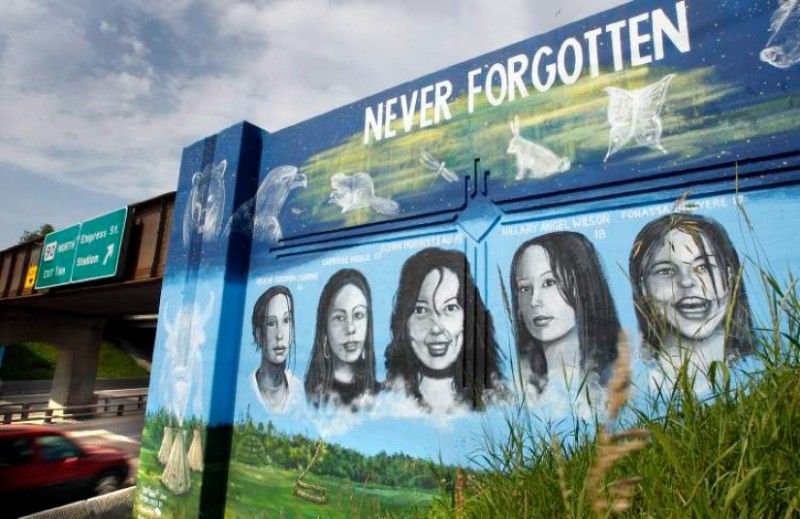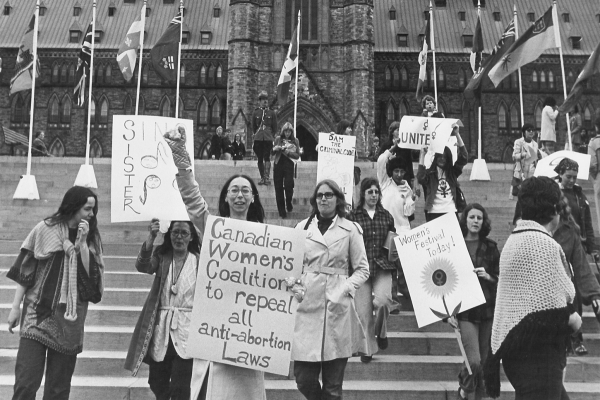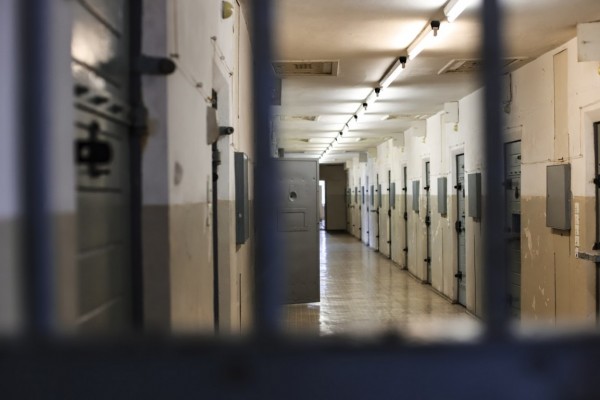Federal budget ignores Canada’s ongoing genocide against Indigenous peoples
This country’s continued denial of basic human rights for Indigenous peoples is written right into budget 2021

Mural artist Tom Andrich’s public display in honour of murdered and missing indigenous women, located on the Portage Avenue and Empress Street overpass in Winnipeg. Photo courtesy UM Today.
Canada is in the middle of the worst human rights crisis in this country’s history—the ongoing genocide of Indigenous peoples, a crime that specifically targets Indigenous women and girls for horrific levels of violence, incarceration, and exploitation, and continues to deny them basic protections.
Canada is a state perpetrator of genocide and despite the many legal, economic and political levers at its disposal, it has failed to take urgent national action to end the abuse and transition away from its genocidal laws, policies and practices.
While the federal budget tabled by Finance Minister Chrystia Freeland on April 19 did include some funding to address this crisis, it pales in comparison to what the Trudeau government has already spent on the Trans Mountain pipeline expansion—a project which contributes to high rates of violence perpetrated against Indigenous women and girls, just like so many other extractive processes across Turtle Island.
Overall, the budget promises almost $18 billion in new money for Indigenous communities including:
- $6 billion for infrastructure;
- $1.2 billion for education;
- $1.4 billion for healthcare;
- $1 billion for child and family services; and
- $2.2 billion to address the “national tragedy” of murdered and missing Indigenous women and girls.
Compared to the 2019 budget of $4.5 billion, this is significantly more money. However, it must be remembered that like the 2019 budget, this allocation is spread over five years and is dependent on the Liberals being re-elected.
We all know that a promise of future money is not worth anything. We also know that the federal government has failed to spend previously promised funds, and just like the former Conservative government, this has resulted in spending shortfalls of hundreds of millions for Indigenous communities (not to mention the huge sums spent fighting Indigenous peoples in courts to deny our rights).
Yes, it is true that the Trudeau Liberals have changed the government’s historically racist and often adversarial rhetoric towards Indigenous peoples, a tone that was characteristic of the former Conservative government led by Stephen Harper. Indeed, the first sentence of budget 2021 reiterates the Trudeau mantra: “No relationship is more important to the federal government than the relationship with Indigenous peoples.” In fairness, this is a dramatic improvement over the rhetoric we heard from the Harper government, which often asserted that First Nations are threats to national security.
It is also true that Harper’s Conservatives ignored the crisis of murdered and missing Indigenous women and girls, refused to undertake a national inquiry, and denied responsibility for the genocide. During Harper’s tenure, he also made massive funding cuts to First Nations and their support organizations, exacerbating the grave human rights violations inflicted by the state against Indigenous peoples. This manifested as increasing rates of murdered and missing Indigenous women and girls, children in foster care, homelessness and incarceration. So, we know that a Conservative budget would look drastically different—and not in a good way.
The last thing we want in Canada is a racist, sexist, fringe party at the helm. So no: the alternative to the Liberal budget is not voting Conservative. The alternative is a better budget.
Just because we don’t want Trumpism unleased in Canada doesn’t mean that the Liberal government can squeak by without being held to account for critical failures in their spending plans. Indigenous peoples and especially Indigenous women must navigate a minefield of racism, sexism, oppression, dispossession, and violence every single day.
The ongoing genocide that results from Canada’s continued violations of Indigenous human rights has resulted in significant casualties. That is why a budget analysis that is quick to celebrate “important first steps” or “historic investments” misses the mark. We are in a pandemic—the entire budget is historic. But the question is: does this historic budget allocate funds which are proportional to the struggles of Indigenous peoples and the ongoing crisis of genocide? The answer is no. In fact, you don’t even see the word genocide in the budget or a measurable commitment to end genocide against Indigenous women and girls.
One also has to ask how the federal government can allocate a specific budget line to the crisis when they still don’t have a National Action Plan—nearly two years after the release of the Final Report of the National Inquiry into Missing and Murdered Indigenous Women and Girls Inquiry.
On what basis did they choose $2.2 billion? Have they costed out the amount based on how they plan to tackle the genocide crisis (because we see precious few details)? Take for example the budget they have allocated under the category of Working with Partners. Extra funding is slated to go to regional Indigenous women’s organizations that have traditionally been excluded due to the historic focus on national Aboriginal organizations like the Assembly of First Nations and the Native Women’s Association of Canada.
Budget 2021 proposes $36.3 million over five years for 30 regional organizations. This means $7.25 million per year for 30 organizations which results in $241,666.67 per organization. Given that these organizations are the ones working with Indigenous women and children on the ground, the ability to hire a couple of staff is a mere drop in the bucket of what is needed. They can only really count on one year of funding as the rest depends on a future election.
This doesn’t sound like a meaningful response to the call for justice they quoted which demands that governments provide core and sustainable funding to national, regional and local Indigenous women’s organizations.
A vigil held by Indigenous girls holding up images of missing and murdered Indigenous women in front of Parliament, October 2018. Photo courtesy of CUPE.
Funding is desperately needed to address a wide spectrum of issues impacting Indigenous peoples across Canada. So, yes, any funding is welcome. However, we must remember that Canada’s purposeful and chronic underfunding of all Indigenous issues has helped to create higher risk levels in Indigenous communities for illness, injury, chronic diseases, suicides, violence and now COVID-19.
There is no such thing as incremental human rights—you either have them or you don’t. The human rights of Indigenous peoples continue to be breached in significant and life-threatening ways. This budget’s failure to centre the ongoing genocide against Indigenous people proves the core finding of the National Inquiry: that the lives of Indigenous women and girls are less valued. Instead of accepting the help offered by the United Nations and the Inter-American Commission on Human Rights, Canada has continued to focus its political lens on things like pipelines and criminalizing our peoples for defending our lands, water and resources.
It also needs to be said that Trudeau bought the Trans Mountain pipeline for over $7 billion (a price tag that has soared to over $12 billion), yet his government has only allocated $2.2 billion to address the ongoing genocide against Indigenous women and girls.
Since Trudeau took office, rates of murdered and missing Indigenous women and girls have increased; the “humanitarian crisis” of our children apprehended into foster care continues; incarceration rates continue to skyrocket (especially for Indigenous women); as does poverty and homelessness. Add to this the ongoing lack of clean drinking water in many First Nations and widespread racism in healthcare and increased killings of Indigenous peoples by police and you can see that nice rhetoric does not address grave human rights violations.
Yes, we are in a pandemic, but this genocide crisis has been going on for decades. Long before the National Inquiry into Murdered and Missing Indigenous Women and Girls issued its final report in June 2019, federal officials promised they would not wait for its publication to act on the crisis. Yet, that is exactly what they have done. The National Inquiry began its work five years ago. We’ve been in a pandemic for a year. Five years and no plan to end genocide? How dare they celebrate this budget as historic.
Meanwhile, the federal government continues to fight First Nations children in foster care in court to deny them their fair compensation for racial discrimination which has resulted in lost years with their families, communities and cultures. The Trudeau Liberals are even fighting St. Anne’s residential school survivors, denying them compensation for the horrors they experienced.
The federal government also continues to defend its right to legislate First Nations out of existence through the registration provisions of the Indian Act, which disproportionately impacts First Nations women and children. Despite losing every court case and every claim at the United Nations brought by First Nations who continue to be excluded from their communities due to sex discrimination in the Indian Act, Canada has dragged its feet in restoring their status. At the time of writing, thousands of First Nations women and children are denied access to critical programs and services and First Nation-specific pandemic measures because the federal government slowed registration during the pandemic.
Declaring Indian registration under the Indian Act an essential service during the pandemic would not only address one of the root causes of genocide against First Nations women and children, it would ensure urgent access to First Nation-specific pandemic measures.
Protecting the human rights of Indigenous peoples is the bare minimum standard necessary to support our dignity. The human right to life is not measured in terms of which political party is the least-worst in its dealings with Indigenous peoples. It is measured by whether Indigenous peoples are protected and supported in our individual and collective human rights to life, health, safety and security.
These basic rights are also set within Indigenous-specific human rights that relate to self-determination and the right to govern ourselves, our lands and our resources according to our own cultures, laws and governing practices. Canada’s continued denial of our basic human rights is written right into budget 2021—a document that clearly falls down on the genocide crisis.
How many more Indigenous women and girls need to go missing before the federal government addresses the crisis for what it is—genocide—and takes the nationwide urgent action that is needed to end it?
Pam Palmater is a Mi’kmaw citizen and member of the Eel River Bar First Nation in northern New Brunswick. She is a longtime CD columnist, and has been a practicing lawyer for 20 years. Currently, Pam is a Professor and the Chair in Indigenous Governance at Ryerson University.










